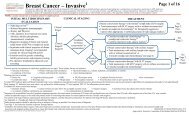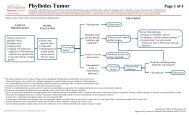MEDICINE
1YkigAQ
1YkigAQ
You also want an ePaper? Increase the reach of your titles
YUMPU automatically turns print PDFs into web optimized ePapers that Google loves.
Patient Care<br />
Treatment Centers<br />
Ambulatory Treatment Center<br />
Michael Overman, MD<br />
Center Medical Director<br />
Brenda Brown, RN, MSN, OCN, NE-BC<br />
Clinical Administrative Director<br />
11,604<br />
377,693<br />
118,097<br />
384<br />
Follow-ups<br />
Procedures<br />
Patient Visits<br />
Average patients per weekday<br />
10<br />
THE UNIVERSITY OF TEXAS MD ANDERSON CANCER CENTER<br />
The Ambulatory Treatment Center (ATC), with 156 beds and 5 clinical<br />
sites, delivers infusion therapy for all of MD Anderson’s specialty centers.<br />
The ATC provides treatments for the adult patient population, 18 years of<br />
age and beyond.<br />
ATC services include:<br />
• Infusions of standard and investigational chemotherapy regimens<br />
• Transfusion of blood products and immunoglobulin infusions<br />
• Administration of fluids and electrolyte replacement<br />
• Injections of all types<br />
• Infusions of antibiotics, anti-fungals and anti-virals<br />
• Infusion pump connections and disconnections<br />
Clinical Center for Targeted Therapy<br />
David Hong, MD<br />
Center Medical Director<br />
Cheryl Fullmer, RN, MBA<br />
Clinical Administrative Director<br />
The Clinical Center for Targeted Therapy (CCTT) is the outpatient<br />
arm of the Department of Investigational Cancer Therapeutics (ICT)<br />
that screens for eligibility and monitors patients with a wide variety of<br />
advanced cancers on early-phase clinical trials for the institution. The<br />
center also offers participation in clinical trials for underserved populations<br />
that are traditionally excluded from early-phase studies — children, the<br />
elderly, patients with active brain metastases, and those with hepatic or<br />
renal failure. The center welcomes patient referrals from outside of MD<br />
Anderson as well as from physicians throughout the institution.<br />
ICT also operates an inpatient service, mostly for patients on Phase I<br />
protocols who require overnight monitoring for high-risk and first-in-human<br />
trials, and for patients receiving hepatic arterial infusions. This inpatient<br />
care also extends<br />
to any patient who<br />
is on or off trial<br />
needing inpatient<br />
management of<br />
treatment side<br />
effects, disease<br />
complications, or<br />
co-morbidities.<br />
2,610<br />
231<br />
1,594<br />
1,027<br />
106<br />
24,873<br />
Total patients served<br />
New patients<br />
Consults<br />
Patients enrolled in clinical trials<br />
Number of clinical trials<br />
Ambulatory care visits<br />
Clinical & Translational Research Center<br />
Daniel Karp, MD<br />
Center Medical Director<br />
We have seen<br />
a steady increase in<br />
average daily census<br />
with a growth rate of<br />
3.9% from FY14<br />
to FY15.<br />
Cheryl Fullmer, RN, MBA,<br />
Clinical Administrative<br />
Director<br />
123<br />
101<br />
251<br />
Passion Lockett, DrPH<br />
Assistant Director<br />
The Clinical and Translational Research Center (CTRC) is a dedicated<br />
unit for intensive monitoring of patients participating in complex, early-phase<br />
clinical trials. A team of outstanding nurses and other clinical staff implement<br />
CTRC-approved protocols. Patients are monitored and evaluated, and<br />
interventions are made as needed.<br />
The center also facilitates “basket” trials in which patients across multiple<br />
disease sites and types are assigned to a treatment study arm according to<br />
their mutations revealed on molecular testing, instead of according to their<br />
disease site of origin. More of these protocols are being considered for the<br />
coming year.<br />
The CTRC Laboratory is housed within the clinic to provide sample<br />
collection, processing, storage, and shipping services to support<br />
pharmacologic studies. Clinical investigation technicians collect and process<br />
primarily blood specimens for the studies. Passion Lockett, DrPH,<br />
assistant director, oversees data entry into the Lab Tracker system, which<br />
improves sample quality and efficiency<br />
by electronically tracking every step in<br />
the process from collection to testing,<br />
storage, and shipping in order to better<br />
document specimens used to develop<br />
new drugs or new drug combinations.<br />
Approved Protocols<br />
Activated Protocols<br />
Active Protocols






